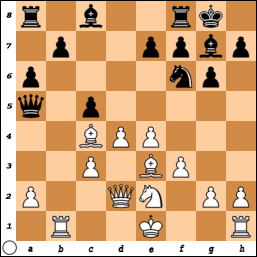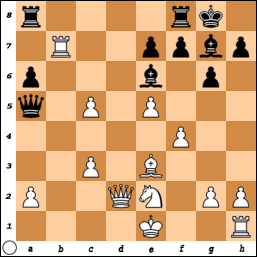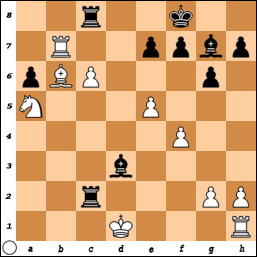Now, however the ordeal is over and somehow my sporting form has returned out of nowhere. Last season, my club team eventually ascended to the Hessenliga, i.e. the 4th division of the German chess league system, and I managed to score 2/2 against strong opposition at the beginning of this year's season. I'm going to post my game from yesterday - a tense encounter against a fine player where I eventually got the best of it.
Oliver Uwira (2251) - Lothar Schnitzspan (2327)
1. d4 Nf6 2. c4 g6 3. Nc3 d5
I've been playing chess for 25 years now, but I still haven't got a clue about how to deal with the Grünfeld defense. The best I have in my armoury is the endgame variation, which Karpov and Kramnik used to torture Kasparov in their World Championship matches. This variation, however, is very drawish, but at least White can't lose so easily.
4. cxd5 Nxd5 5. e4 Nxc3 6. bxc3 Bg7 7. Be3 c5 8. Qd2 Nd7!?
Oh well... Black does not want to play the endgame which arises after 8...Qa5 9. Rc1 cxd4 10. cxd4 Qxd2+ 11. Kxd2. Instead, he plays a move that I had never seen before. Now I am on my own!
9. Bc4 Nf6 10. f3 O-O 11. Ne2 Qa5 12. Rb1 a6

White is at a crossroads. If I don't do anything at all, Black will simply expand his queenside and should not have any problems at all. I therefore decided to gobble up the pawn at c5 after a couple of preparatory moves, thus ruining my structure while counting on the resulting passed pawn and the material advantage.
13. e5 Ne8 14. f4 Nc7 15. dxc5 Ne6 16. Bxe6 Bxe6 17. Rxb7

Phase One has been accomplished. Now the hopes of White hinge on the passed pawn at c5. The other pawns on the queenside are most likely beyond rescue. White might also face trouble on the light squares.
17...Rfd8 18. Nd4 Bxa2
This move did actually surprise me because it allows a tactical simplification that should turn out to be in White's favour. The post-mortem analysis with my opponent convinced me, though, that this is Black's best try, as otherwise Black might find it well impossible to create enough compensation for his material deficit.
19. Nc6! Rxd2 20. Nxa5 Rc2 21. c4 Bxc4 22. Kd1?
Overly ambitious, and likely to cause White serious trouble. I thought it would be a good idea to go and overload the black bishop with the defense of the rook and the promotion square at c8 - I didn't, however, account for the black mating ideas (seriously!) that show up once Black plays Bh6. This could have cost me dearly, but fortunately Black didn't find a safe path through the maze. Much better was 22. Nxc4 Rxc4 23. Ke2 after which Black has to fight for the draw due to the comic positioning of his bishop at g7.
22...Bd3 23. c6 Rc8 24. Bb6 Kf8?

This is a serious mistake and probably loses already. The king runs to aid the rook in containing the white pawn, but Black sets himself up for various backrank mate tactics. Much better was 24...Bh6! and after 25. g3 Be4 White is in dire straits. I haven't dug deeply yet but I believe this would have been the refutation of 22. Kd1.
25. c7 Rxg2 26. Re1 Bc2+ 27. Kc1 Bf5 28. Rb8 Ke8 29. Rxc8+ 1-0
Black resigned because of the point 29...Bxc8 30. Rd1 Bd7 31. c8Q+ Bxc8 32. Rd8#.


Ja lebt denn der alte Holzmichel noch?
ReplyDeleteJa erlebt noch!